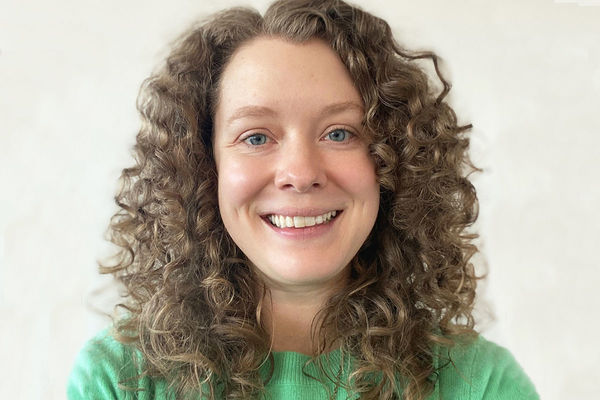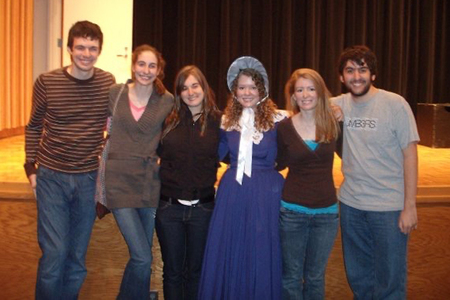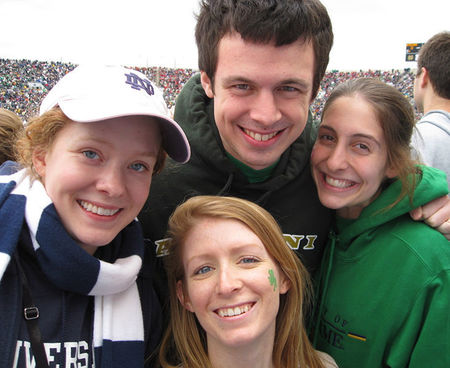
Michelle Gaseor ’11 doesn’t meet many other history majors in the tech world.
But in her career, which has taken her from educational publishing and user experience design to the forefront of conversational artificial intelligence, she continually builds upon the foundation she established in the College of Arts and Letters.
“My liberal arts education really taught me how to be curious and self-directed in exploring things I’m interested in,” she said. “That has been essential to being successful in my career.”
Gaseor relies on these core characteristics as she navigates and advances in a field that hardly existed during her undergraduate years.
“If you had told me when I was at Notre Dame that I would be doing work related to artificial intelligence, I would have laughed at you,” she said. “None of that was on my radar as a college student. But the ability to learn and teach yourself, to collaborate with others, to be humble about what you know and don’t know, and to help teach these skills to other people — that carries through it all.”
Cultivating curiosity

Growing up in suburban Chicago, Gaseor’s parents instilled in her a love of learning and a curiosity for the world around her. She was a precocious reader, with a special interest in historical fiction that blossomed into her academic study of history.
At Notre Dame, she focused on French and Japanese history, along with significant coursework in both languages. She also studied abroad at the prestigious Paris Institute of Political Studies, or “Sciences Po.”
“Studying languages teaches you to step outside your perspective — a critical skill for any career,” Gaseor said. “Learning languages can also have unexpected benefits years into your career. My knowledge of French and Japanese ultimately allowed me to shift from a career in educational publishing to one in conversational AI, where I focused on communication between machines and people.”
“Studying languages teaches you to step outside your perspective — a critical skill for any career. Learning languages can also have unexpected benefits years into your career. My knowledge of French and Japanese ultimately allowed me to shift from a career in educational publishing to one in conversational AI, where I focused on communication between machines and people.”
Gaseor’s studies in history and languages also allowed her to develop invaluable skills in data analysis, linguistics, writing, critical thinking, and research. She marshaled all of these skills to write her senior thesis on Lucie Dreyfus, the largely understudied wife of the man at the center of the Dreyfus Affair, a political scandal that divided France around the turn of the 20th century.
Her thesis took top honors in the Department of History, which helped her get into several Ph.D. programs. A year into her doctorate, she discovered she didn’t want to pursue a career in academia.
“I realized that a lot of the things I enjoyed about being a history academic, I could find in other careers,” Gaseor said. “You can find opportunities to research and write in other careers. And just because you’re not an academic doesn’t mean that you can’t be curious and read books on history or study new things.”
From publishing to tech

After leaving the Ph.D. program, Gaseor made a list of careers that would interest her and decided to dive into the world of publishing. She tapped the Notre Dame network, did more than 300 informational interviews, and ultimately landed a job at McGraw-Hill Education right around the time it was transforming from a traditional publishing company into an e-learning juggernaut.
Gaseor’s job quickly became tech-focused as she focused on user experience design and gained extensive experience in content strategy for products such as adaptive e-books and digital learning platforms for students to complete homework.
“User experience design really brought together all the things that I enjoyed from being a history major and from other things I had tried in my career,” she said. “It’s very much about learning and research and writing.”
As Gaseor’s job at McGraw-Hill became increasingly tech-focused, she made the decision to stay in the fast-growing tech industry as she took her next step. So, she followed the same formula she used to get into the publishing world.
“Getting to the next step, the process is always the same — asking ‘What is it that I like about what I do, what is it that I would want to change about what I do, and what is it that makes me curious?’” she said. “Then, it’s just a matter of networking.”
That process took Gaseor to IPsoft, where she served as the artificial intelligence pioneer’s first AI intent recognition designer. She worked extensively on conversational artificial intelligence while building on her experience in UX design.
She recently left IPsoft to pursue an opportunity in the field of podcasts, but regardless of her role, she always returns to her liberal arts roots to enrich her life personally and professionally.
“My liberal arts education has taught me the importance of the humanities in my personal life — they really enrich the day-to-day with art and design and reading and music and appreciation of world culture,” Gaseor said. “And in my career, that liberal arts education taught me to never stop learning and to have a growth mindset in how I approach life.”
“My liberal arts education has taught me the importance of the humanities in my personal life — they really enrich the day-to-day with art and design and reading and music and appreciation of world culture. And in my career, that liberal arts education taught me to never stop learning and to have a growth mindset in how I approach life.”
Originally published by at al.nd.edu on June 03, 2020.